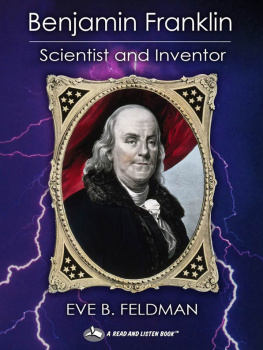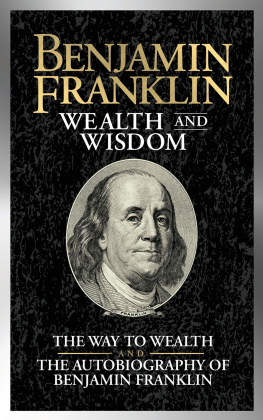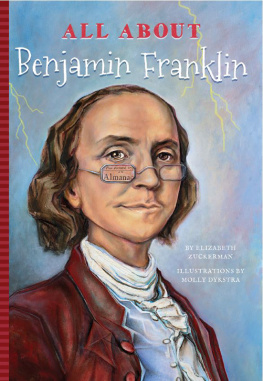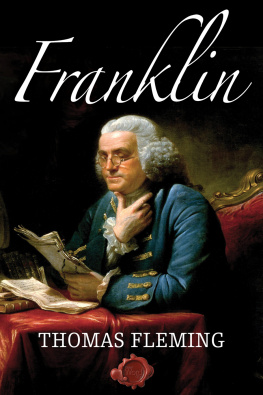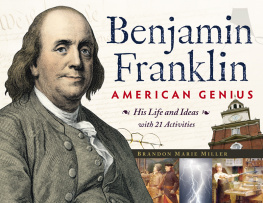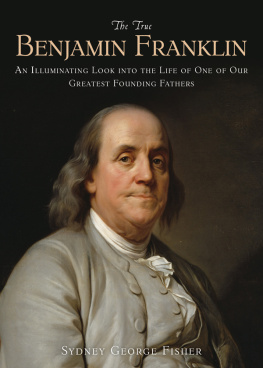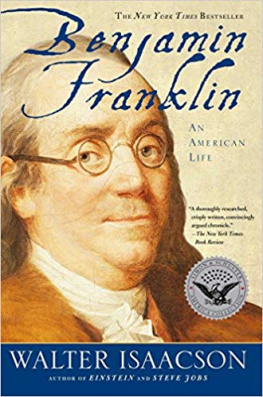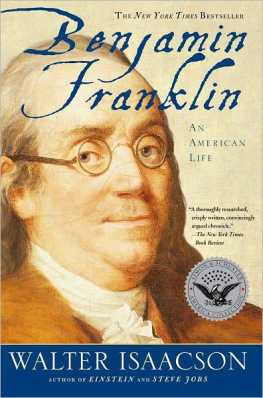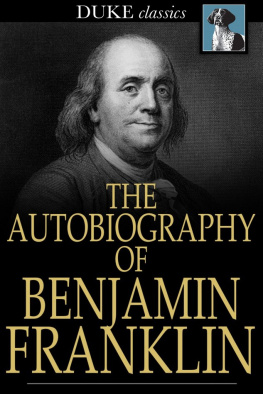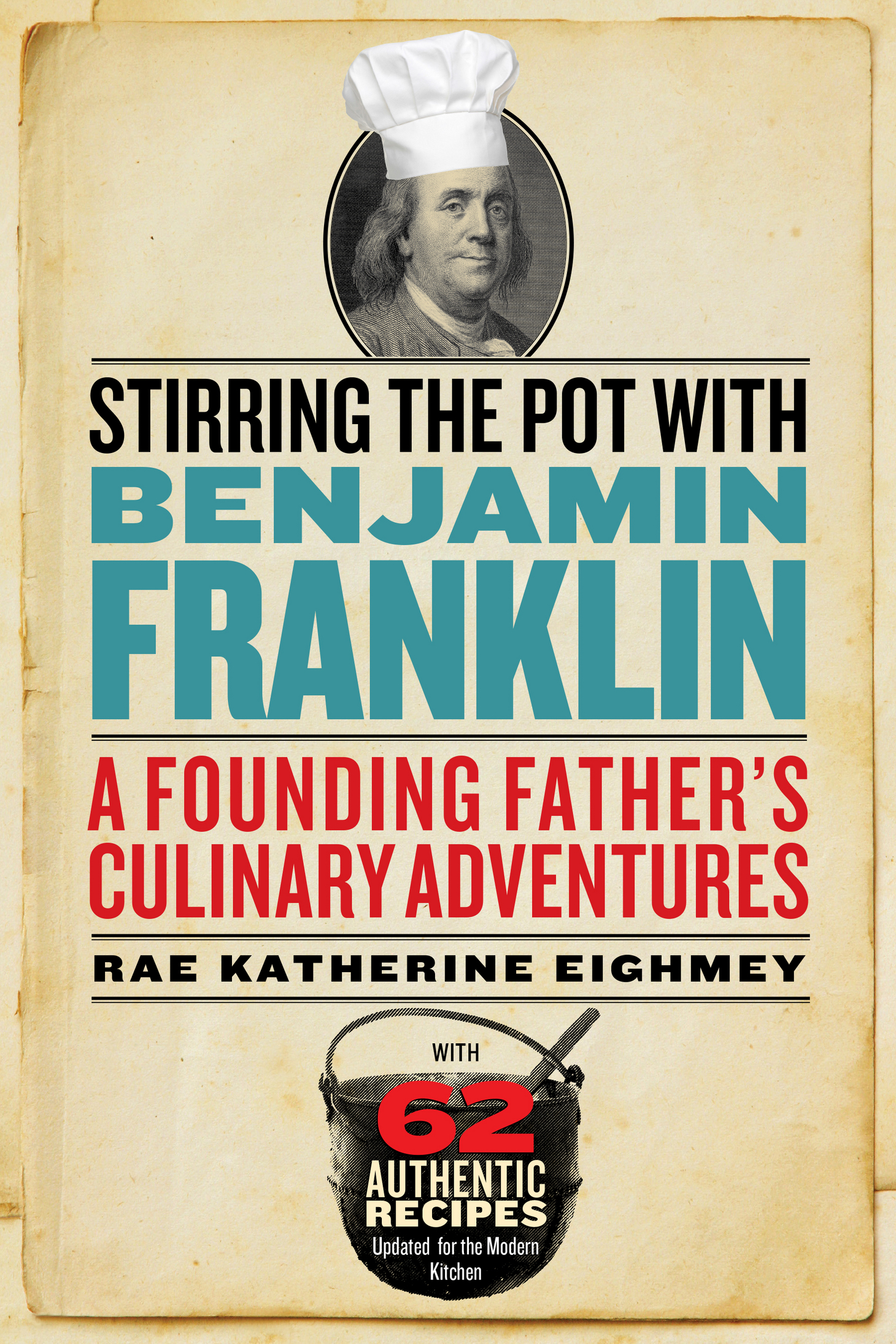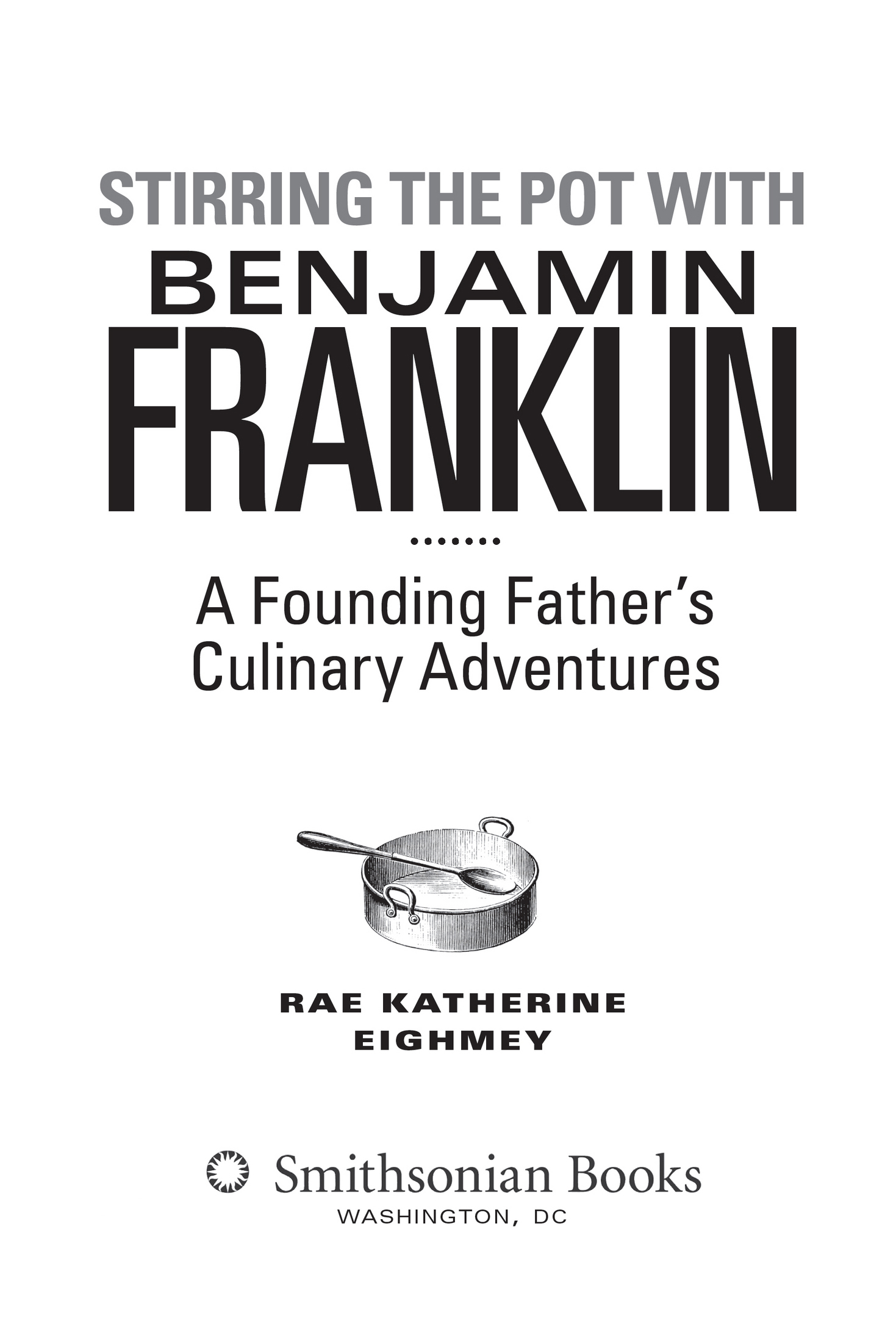Contents
Text 2018 by Rae Katherine Eighmey
All rights reserved. No part of this publication may be reproduced or transmitted in any form or by any means, electronic or mechanical, including photocopying, recording, or information storage or retrieval system, without permission in writing from the publisher.
This book may be purchased for educational, business, or sales promotional use. For information, please write: Special Markets Department, Smithsonian Books, P. O. Box 37012, MRC 513, Washington, DC 20013
Published by Smithsonian Books
Director: Carolyn Gleason
Senior Editor: Christina Wiginton
Creative Director: Jody Billert
Editorial Assistant: Jaime Schwender
Text edited by Evie Righter
Recipes edited by Susan Stuck
Typeset by Paul Hotvedt/Blue Heron
Library of Congress Cataloging-in-Publication Data
Names: Eighmey, Rae Katherine, author.
Title: Stirring the pot with Benjamin Franklin : a founding fathers culinary adventures /
Rae Katherine Eighmey.
Description: Washington, DC : Smithsonian Books, [2017] | Includes
bibliographical references and index.
Identifiers: LCCN 2017001149 | ISBN 9781588345981
Subjects: LCSH: Cooking, American. | United StatesHistoryColonial period, ca. 16001775. | Franklin, Benjamin, 17061790Contributions in cooking.
| StatesmenUnited StatesBiography. | United StatesSocial life and customs18th century. | LCGFT: Cookbooks.
Classification: LCC TX715 .E33685 2017 | DDC 641.5973/09033dc23
LC record available at https://lccn.loc.gov/2017001149
Manufactured in the United States
Ebook ISBN9781588345998
v5.1
a
For Jack, Jonah, Justin, and Nic
To inquisitive minds, like yours and mine, the reflection that the quantity of human knowledge bears no proportion to the quantity of human ignorance, must be in our view rather pleasing, viz. that though we are to live forever, we may be continually amused and delighted with knowing something new.
Benjamin Franklin letter to his friend Jan Ingenhousz, September 2, 1786
The Book of Nature is a very large and comprehensive Volume; And notwithstanding no small part of it has been unfolded and exposed to our view, by learned and ingenious men of this and many other countries; yet it still contains abundantly sufficient matter to exercise our talents upon, and which justly ought to excite our curiosity, and encourage us to proceed with vigour, in our endeavours to bring to light, what is at present concealed from our eye.
George Parker, Earl of Macclesfield, in a speech awarding the Royal Societys Copley Medal for outstanding achievements in research in any branch of science to Benjamin Franklin for his work with electricity, November 30, 1753
INTRODUCTION
Benjamin Franklins culinary adventures were as unlimited as his curiosity, scientific imagination, and inventive genius.
He was a vegetarian. Well, for a while.
He cooked his own breakfast and then reformed the eating habits of a group of young English printers.
Benjamin loved vegetables and sought seeds for unusual varieties.
He designed cooking equipment and even modified kitchens.
Franklin suggested the contents of shipboard meal kits for those making weeks-long North Atlantic crossings and devised saddle-bag mess supplements for soldiers in a war zone.
He was an advocate for eating locally grown foods and he especially valued American corn.
He championed healthy eating habits.
His The Drinkers Dictionary of 1757 promoted moderation. Still he enjoyed a glass, or two, of Madeira and cups of alcoholic punch.
Franklin dined with scientists, writers, government officials, and political leaders in the Colonies, England, and France.
He electrically shocked turkeys as a way to prepare them for dinner.
And he understood the storytelling power of food.
In the summer of 1771, Benjamin Franklin found himself with a weeks uninterrupted leisure while staying at the English countryside home of his good friend, Jonathan Shipley. Now sixty-five-years old, Benjamin set out to write the story of his rise from poverty and obscurity to a state of affluence and some degree of reputation in the world. He addressed the stories to his son William, serving as the Colonial Governor of New Jersey, saying my posterity may like to know, as they may find some of them suitable to their own situations, and therefore fit to be imitated.
As Franklin reached back more than fifty years, he turned to memories of breads and tarts, fish and soup, to relive important events. As youll see, the first two independence-seeking actions of his rebellious teenage years had food as key elements.
I didnt start out thinking about Benjamin Franklin as a culinary adventurer. I pictured the grandfatherly fellow with bifocals and a cane. I knew the slightly stout Founding Father frequently pictured in a fancy stylish coat, sometimes with a wig, other times in the rustic fur hat he adopted for his time in Paris. Now, after years of reading his words and what others wrote about him, studying his life and environment, and cooking his foods, Ive realized the important role ingredients and even recipes play in understanding his life and times.
Ive come to know him and his wife Deborah well. The young Franklin was athletic and smart. As a businessman in Philadelphia, he regularly demonstrated his strength as he pushed carts of printing paper through the streets. He was an accomplished horseman. Later, in London, during his fifties, he may have been slowed physically by the effects of gout, yet he had more intellectual pots on the stove than seems possible for one man. As he aged, his thoughtful negotiations on both sides of the Atlantic laid the groundwork for the success of the new nation.
In the pages that follow well see how he grew from a hard-working, self-educating lad to a successful and innovative printer, dedicated husband, and then astute businessman and statesman. At every point he was a dynamic and pragmatic problem solver bringing the lessons he learned at his fathers table to business, politics, and nation building. Benjamin led me down fascinating paths beyond foodways and statesmanshipscience, printing, electricity, music, and poetry in Boston, London, Paris, and Philadelphia. Through their letters Benjamin and Deborah brought me into their cheerful home. Franklin had three childrentwo sons and a daughter. His wife, Deborah, was a partner in his businesses, and this was a key factor in his ability to serve as a diplomat in London for fifteen years. She held the house, business, and extended family together. Oh! and she was a good cook.
I have long known that food is the most powerful connection to our own past and to the lives of others. With Franklinfood takes us back not only to his life and times, but to some of our nations as well.
However Franklin stirred the pot over his long careerfrom the gentle simmer of fostering new ideas to the rapid boil of revolutionhis thoughts and actions provide food for thought.
For the past three decades, Ive spent my time cooking with centuries-old recipes, then eating meals made from them. These delicious efforts have been my path for understanding and interpreting social trends and historical events.


